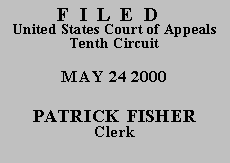

| JOHN A. TAYLOR,
v. STATE OF WYOMING; WYOMING ATTORNEY GENERAL, in his official capacity; WYOMING DEPARTMENT OF FAMILY SERVICES; FREMONT COUNTY; FREMONT COUNTY OFFICE OF FAMILY VIOLENCE; ELIZABETH A. KAIL, in her official capacity as Ninth Judicial District Judge, Fremont County; NANCY J. GUTHRIE, in her official capacity as Ninth Judicial District Judge, Fremont County; D. TERRY ROGERS, in his official capacity as Ninth Judicial District Judge, Teton County; JEFFREY A. DONNELL, in his official capacity as District Judge for the Second Judicial District Court; FRANK D. PEASLEY; MAUREEN DONOHOUE; JANET ELIZABETH TAYLOR, |
No. 00-8000
(D.C. No. 99-CV-85-J) |
Taylor filed the instant complaint, ostensibly pursuant to 42 U.S.C. §§ 1983, 1985, and 1986. As best we can discern from the complaint, Taylor claims due process and equal protection violations stemming from certain undisclosed actions taken by defendants with respect to a minor child. The district court dismissed his complaint for failure to state a claim and as frivolous, stating that "[h]is incoherent and conclusory claims are frivolous and fail to set forth a factual basis to establish any constitutional violation." (R. Doc. 6 at 2.)
On appeal, Taylor asks "[w]hether the Constitutions of the United States of America, State of Wyoming and Laws have been suspended," and if they have not been suspended, whether we are "under MARTIAL LAW." (Appellant's Br. at 1.) He then goes on to raise various conclusory challenges to his incarceration, as well as attaching letters protesting the alleged seizure of certain law books. We note that not only does Taylor's brief fail to address the district court's conclusion that his complaint fails to state a claim and is frivolous, it is, in fact, completely unrelated to the allegations of that complaint. Our independent review of Taylor's complaint readily confirms that it fails to state a claim and is patently frivolous.
"If we dismiss as frivolous the appeal of an action the district court dismissed under 28 U.S.C. § 1915(e)(2)(B), both dismissals count as strikes." Jennings v. Natrona County Detention Ctr. Med. Facility, 175 F.3d 775, 780 (10th Cir. 1999). The district court correctly determined that Taylor's complaint both fails to state a claim and is frivolous, and its dismissal therefore falls under 28 U.S.C. § 1915(e)(2)(B)(i) & (ii) ("the action . . . is frivolous" and "the action . . . fails to state a claim for which relief may be granted"). Because this appeal likewise lacks any arguable basis in law or fact, we deem it to be frivolous under 28 U.S.C. § 1915(e)(2)(B)(i). Taylor incurs strikes one and two for purposes of 28 U.S.C. § 1915(g). He is advised that if he incurs one more strike by filing further frivolous suits or appeals, under the Prisoner Litigation Reform Act of 1995 he will no longer be entitled to proceed in forma pauperis in a civil action in federal court--other than petitions for writ of habeas corpus--not involving "'imminent danger of serious physical injury.'" White v. Colorado, 157 F.3d 1226, 1232 (10th Cir. 1998) (quoting 28 U.S.C. § 1915(g)), cert. denied, 119 S. Ct. 1150 (1999).
We remind Taylor of his continuing obligation to pay all installments of the deferred district court and appellate filing fees until they are paid in full. No exception is made for dismissed appeals. See 28 U.S.C. § 1915(b)(2); Jennings, 175 F.3d at 781.
The judgment of the district court is AFFIRMED. Taylor's "Petition for Injunction" and "Motion for Sanctions" are DENIED.
The mandate shall issue forthwith.
ENTERED FOR THE COURT
Carlos F. Lucero
Circuit Judge
*. The case is unanimously ordered submitted without oral argument pursuant to Fed. R. App. P. 34(a)(2) and 10th Cir. R. 34.1(G). This order and judgment is not binding precedent, except under the doctrines of law of the case, res judicata, and collateral estoppel. The court generally disfavors the citation of orders and judgments; nevertheless, an order and judgment may be cited under the terms and conditions of 10th Cir. R. 36.3.